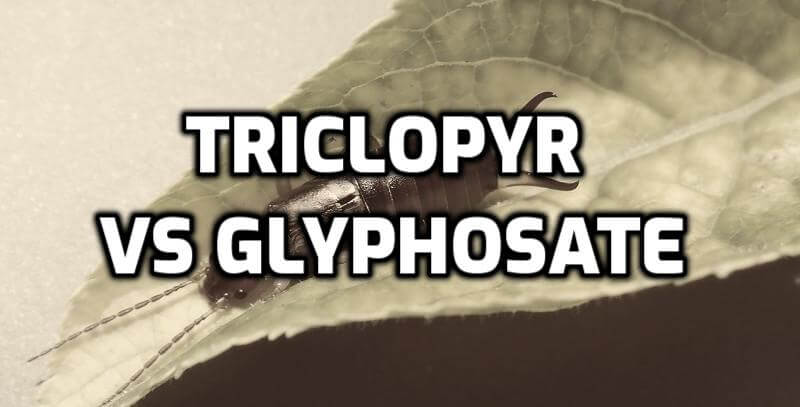Triclopyr Vs Glyphosate Herbicide

Triclopyr and Glyphosate are two distinct herbicides with different modes of action, selectivity, and environmental impacts. Triclopyr mimics plant hormones, targeting specific plants like broadleaf weeds, and has residual soil activity. It’s considered less harmful to humans but can affect aquatic life.
Glyphosate inhibits a vital plant pathway, affecting most plants it contacts. Its environmental and health impacts are debated, and its overuse has led to some weed resistance. While Triclopyr has ester and amine formulations, Glyphosate comes in various brands, often combined with other chemicals to enhance its potency.
Triclopyr Vs Glyphosate Table
This table will discuss the similarities and differences between these two products and some of their applications.
Triclopyr | Glyphosate |
Product: Hi-yield Triclopyr Ester | Producs: Killzall |
Active Ingredient: Triclopyr | Active Ingredient Glyphosate |
Triclopyr Kills Only Broadleaf Plants | Glyphosate Kills All Plant Species |
Pet Safe If Used As Directed On Label | Pet Safe If Used As Directed On Label |
Do Not Use A Surfactant When Treating Lawns | For Best Results, Apply On Warm Sunny Days |
Apply During Warm Weather, Early Spring Through Fall | Prevent Stump Or Weed Regrowth In Your Lawn |
Mix 3/4 Oz. Per 1 Gallon Of Water Which Can Cover Per 1,000 Sq. Ft. | Mixing Ratio 2.5 Oz. Per Gallon Treats Approx. 300 Sq. Ft. |
Killing It Down To The Root | Killing It Down To The Root |
It kills Black Medic, Bull Thistle, Clover, Dandelion, Ground Ivy, Kikuyugrass, Plantain, Ragweed, Wild Carrot, Wild Violet And Others | It Kills Annual Bluegrass, Barnyardgrass, Chickweed, Clover, Common Plantain, Garden Spurge, Dandelion, Fescue Species, Oak Species, Yellow Nutgrass, Zoysia And Other |
Mode of Action
Triclopyr and Glyphosate are both herbicides, but they work through different mechanisms to achieve plant control. Triclopyr’s primary action is by mimicking plant hormones, particularly auxins. When introduced to plants, it induces abnormal growth patterns, eventually leading the plant to its death. This is a unique mechanism targeting the hormonal balance of plants.
Glyphosate, on the other hand, has a more direct approach. Its mode of action involves inhibiting the shikimic acid pathway. This particular pathway is responsible for producing essential amino acids in plants. By blocking this, Glyphosate effectively stops plants from generating the critical proteins they need to grow and survive.
Selectivity
The selectivity of a herbicide determines which plants it affects and which it spares. Triclopyr stands out for its selectivity. It is specifically formulated to target and kill certain plants, mainly the broadleaf variety. However, it’s friendly towards other plants like grasses, leaving them untouched and healthy.
On the contrary, Glyphosate is the proverbial broad brush. Being non-selective, it doesn’t discriminate between plants. Almost every plant that comes in contact with Glyphosate gets damaged or killed.
Usage
Regarding application areas, Triclopyr is predominantly chosen for broadleaf weeds and woody plants. This makes it a favorite for pastures and lawns where one wants to eradicate broadleaf weeds but spare the grass.
Glyphosate’s reach is broader. Given its non-selective nature, it’s employed in various environments: agricultural fields, residential areas, or gardens. It’s the go-to herbicide for those wanting to clear an area of all plant life.
Residual Activity
After application, some herbicides might remain active in the soil for some time. Triclopyr is one such herbicide. It exhibits some residual activity in the soil, potentially impacting subsequent plants that might come into contact with the treated soil.
Glyphosate, in contrast, is more transient. It doesn’t maintain much-lingering activity in the soil. It breaks down relatively quickly, becoming inactive once it bonds with soil particles.
Environmental Concerns
The environmental footprint of a herbicide is critical. Triclopyr, when used as recommended, poses low toxicity threats to humans and animals. However, its ecological downside is its potential hazard to aquatic life if it enters water bodies. The environmental impact of Glyphosate is more debated.
There’s a split in research findings: some indicate risks to both the environment and human health, while others vouch for its safety when applied correctly. A notable concern has been the IARC’s classification of Glyphosate as a potential carcinogen. Moreover, Glyphosate is recognized as toxic to aquatic organisms, raising concerns for aquatic ecosystems.
Resistance
Overusing any herbicide can lead to resistance, making the herbicide less effective over time. Triclopyr has been fortunate in this respect, with resistance reported less frequently.
Glyphosate’s story is different. Its extensive use, especially in the context of genetically engineered crops designed to tolerate it, has led to certain weed species developing resistance. This means these weeds no longer respond to Glyphosate treatments as they once did.
Formulations
In terms of available formulations, Triclopyr offers variety. It can be found in both ester and amine forms, each boasting specific properties suitable for distinct applications.
Glyphosate, owing to its widespread use, is marketed under several brand names and formulations. It is often amalgamated with other chemicals or surfactants to enhance its potency. This makes it adaptable to various conditions and requirements.
Our Observation
Between Triclopyr and Glyphosate, the choice of the superior herbicide largely depends on the desired application. Triclopyr mimics plant hormones, selectively targeting broadleaf plants and showing residual soil activity. This makes it suitable for pastures and lawns where selective weeding is needed without harming the grass.
Glyphosate works by inhibiting essential amino acid production, displaying non-selective properties effective for general weed clearance across varied environments. Despite its widespread use, Glyphosate’s resistance to weeds is a growing concern. Additionally, while Triclopyr is notably hazardous to aquatic life, Glyphosate’s overall environmental and health impacts remain contentious.
Triclopyr proves more beneficial for specific targeting, but Glyphosate holds the edge for broad applications and complete eradication. It’s crucial, however, to consider environmental implications and the potential for resistance when selecting an herbicide.

James E. Butkovich, Pest control maven with a knack for eco-friendly & Chemical solutions. Blogger with a mission to make homes pest-free, one post at a time.

